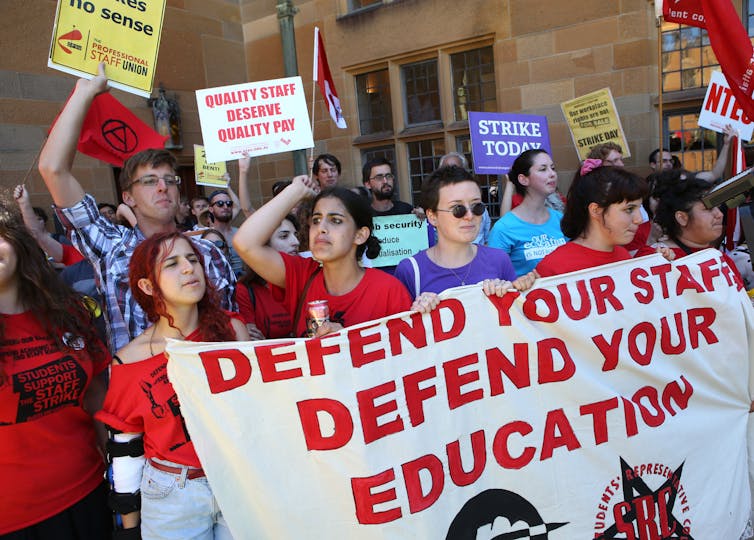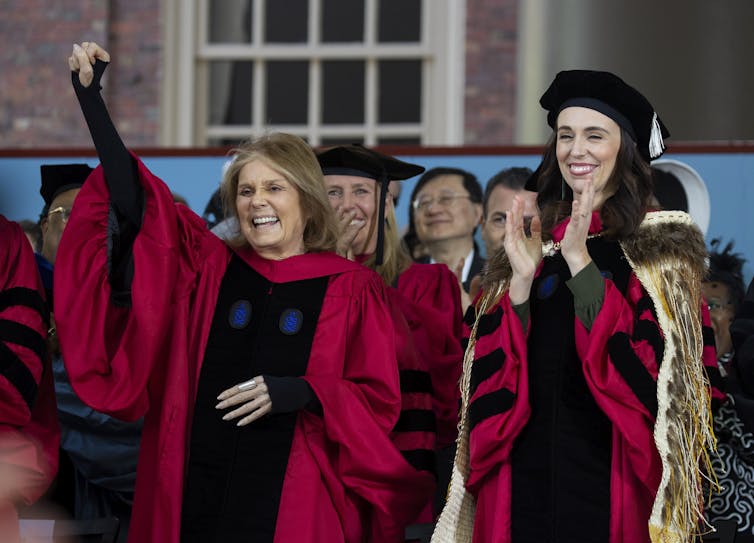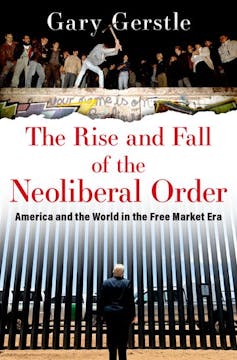
What state are the Australian academic humanities in? Simple. They’re demoralised. How can I tell? The signs are everywhere, but let’s just say that whenever humanities academics get together these days, conversations inevitably turn to a single topic: how bad things are.
In this, the humanities don’t stand alone. Nurses, teachers, truckies, call-centre workers and many others feel harried and oppressed too. We are all working under management regimes – let’s call them neoliberal – that care about things like efficiency, workplace safety, profits, productivity, obeying the regulations, fulfilling the strategic plan. But they don’t care much about us.
This worsening of working conditions across the board affects the humanities in a particular way. For centuries, the humanities were where cultural values and understandings were developed and debated; where history was uncovered; where heritages were preserved and assessed; where abstract thought was allowed to roam free. So neoliberal managerialism, with its loyalty to market forces rather than to values, traditions, ideas and people, damages them especially badly.
Read more: Defunding arts degrees is the latest battle in a 40-year culture war
There is a problem here, however. Those who appreciate the significance of the humanities tend to be involved in them to start with. In theory, the humanities matter to the culture as a whole; in practice, they matter mainly to themselves. This circularity limits and further demoralises the humanities.
To try to move past this circularity, it is useful to remember the European humanities’ history. In very general terms, they have passed through three phases since they were established in their modern form about six centuries ago.

At first, they took over from the Church responsibility for the cultural and spiritual life of independent gentlemen. By 1800, the Germans had come up with a name that stuck for this mode of secular spiritual cultivation: Bildung.
At the same time, humanities disciplines solidified. By the mid-19th century, to be educated in the humanities was simultaneously to be cultivated and to be trained in the procedures and scholarship of a specific discipline.
In their next phase, the humanities were granted responsibility not just for an individual’s cultivation, but for the flourishing of citizenship.
With the rise of political democracy in the late 19th century, the ruling class came to believe that the population needed to be educated in the humanities to exercise their power responsibly. People needed to develop their capacity for critical reflection and analysis, their appreciation of the hallowed cultural heritage, and their civic virtue. That way, so it was thought, democracy, now in the hands of the working class, would not descend into populist chaos.
Across the first two phases of the humanities’ history, academics came to be regarded as independent professionals with the autonomy to shape their own workplace ecology and purposes. They were considered to hold a dignified office whose responsibility was not, in the end, to the university that happened to employ them, but rather to the discipline in which they had been trained over years.
The third phase is now. Education is thought of in economic terms. Its first value is to augment national economic productivity; its second to secure good jobs for graduates. That’s more or less it.
Although the humanities have a larger economic function than they are often given credit for, they remain secondary players in terms of GDP and the job market. That is the main reason why they are sidelined by politicians and business interests concerned almost entirely with economic prosperity.
Read more: The government's funding changes are meddling with the purpose of universities
The rise of managerialism
Thinking about the education system as a tool for economic productivity changed everything.
When I began my academic career in the 1980s, universities were still self-governing institutions mainly run by academics for their students and themselves. Heads of departments (departments existed then), deans, even vice-chancellors were academics. Once they finished their stint in administration (it wasn’t “management” yet), they regularly returned to teaching and research.
In the mid-1990s, that changed. Universities were democratised. The old training colleges were redubbed “universities”; the “binary system” became the “unified national system”. Student participation as a proportion of the total age cohort expanded an amazing fourfold between 1970 and 2000. University building projects billowed, along with marketing budgets.
To pay for it, universities became globalised businesses. Students became paying customers. International students (who tend not to take humanities courses) became the most attractive customers, because they could be charged more. Courses became commodities, increasingly taught not by permanent academics, but by precariously placed teachers on short-term contracts. Administrators became bosses with total control of the institution, whose main interest was turnover and profit (as well as their own salaries, which headed into the stratosphere).

The few people with power in universities rarely engaged meaningfully with those who taught and researched. Today, even lowly academic managers often know little about the people or disciplines they are supposed to manage.
Once education was considered an economic tool, the humanities changed internally as well. They become divided in new ways. Most notably, a post-disciplinary humanities emerged. Traditional disciplines – philosophy, history, English, the classics, art history – are now often regarded by both managers and students not as bodies of practice and scholarship built up over centuries, but as strictures from which to be freed.
New programs, studies and diplomas proliferate. Almost anything can be studied, with no disciplinary training required. Programs like media studies, legal studies, museum studies and international relations are attractive commodities because, supposedly, they produce graduates who are “job-ready”.
Yet because students sign up to them primarily for the certificate, many of these studies don’t transmit practical skills at all. They teach “theory” in a new liberal-democratic mindset – more or less the same theory and mindset across the board.

Read more: Stop telling students to study STEM instead of humanities for the post-coronavirus world
Humanities, old and new
With the rise of these new programs and fields, the traditional humanities disciplines reactively mutated into the “old humanities” in a way that meant they began to judge and rebuke their successors.
Even people who have no memory of the university’s traditional structures and values (and soon that will include not only all students but all academics too) can sense that the old humanities require protracted training, a slowly acquired understanding of a discipline’s past, a breadth of knowledge and sympathy. The old and new humanities are at odds with one another, because a similar heritage of reflection on method and concepts, a similar archaeology of discovery, doesn’t usually exist in the present-centred new humanities. And because the old humanities, embedded in history, have a less utilitarian ethos than the new post-disciplines.
At the same time, a new economy of prestige has developed. The old humanities still sit at the top of the pile globally. Internationally, the most prestigious universities, even in English-speaking countries, have not fully gone down the post-disciplinary path. Arguably, the post-disciplines dominate the Australian humanities more than anywhere else in the world. But academic prestige remains with Oxbridge and the Ivy League, where the old humanities still reign.

In Australia, the old humanities are increasingly supported by upper-middle-class students, who can afford the costs of study without worrying too much about debt and immediate job prospects, alongside a few students who love subjects in the old humanities enough to risk sacrificing something for them. And I don’t suppose we should forget the tiny cohort of students who win scholarships to study more traditional topics in the Ramsay Centre for Western Civilisation or at a few sandstone universities. A certain elitism, historically crucial to the humanities, is intensifying again here.
Read more: Arts education is facing massive cuts – yet its value is felt everywhere
Post-1960s and the ‘Left Brahmins’

It is remarkable that this new turn in the humanities – the turn to managerialism, post-disciplinarity, economism – happened at the same time as the humanities veered further to the left.
Neoliberal managerialism and the new humanities share roots. As many studies have shown (for instance, recently, Gary Gerstle’s The Rise and Fall of the Neoliberal Order), the cultural revolution of the 1960s, which created a suite of liberation movements – civil rights, feminism, anti-colonialism, LGBT rights – also provided room for the neoliberalism to come.
Both movements – neoliberalism and sixties radicalism – are committed to freedom, as well as to breaking down barriers. Both are secular and culturally egalitarian. Both are intolerant of inherited canons, heritages and hierarchies.
Sixties radicalism was unique in that it did not primarily involve class struggle or economic justice; it was more about lifestyle and recognition of marginalised identities. In 1968, radical students demanded that their education leave the ivory tower and become “relevant” – a relevance neoliberalism has delivered, if on unexpected terms.
So the humanities’ leftward turn has not, of itself, posed a threat to higher education’s market-orientated business model.
But the fact the post-disciplinary humanities and neoliberal managerialism swim in the same historical stream doesn’t mean that if you study, say, legal studies or international relations you will hear much praise of neoliberalism. You won’t. A horror at the devastation that intense market orientation wreaks on long-held values and autonomies seeps into fields that markets help generate.
For all that, when conservative politicians complain that the education system has been taken over by “Marxists”, or (in the United States) by “critical race theory”, they are gesturing to the way in which the educated public sphere has absorbed the humanities’ progressive values. The educated public sphere has so successfully absorbed the ethos of the sixties, which is also that of the academic humanities, that this ethos has come to define a class – the “knowledge class”, which Thomas Piketty has named the “Left Brahmins”. This is the class who, for instance, just helped remove the Liberal-National coalition from power.
I think Piketty is right to argue that resentment against the Left Brahmins by those who cannot, or at least have not, joined the educated elite is one of contemporary politics’ strongest drivers, at least in English-speaking countries. It fuels the kind of populism that we have seen Donald Trump, Boris Johnson and Scott Morrison exploit, and with it a right-wing politics of spite against the humanities.
Such resentment is understandable. As George Orwell noted decades ago in The Road to Wigan Pier, there is something repugnant about a progressivism embraced by those who have no experience of the struggles and the sheer physical grind of those who don’t hold the right certificates. Or about those who want to decolonise the culture while enjoying all colonialism’s fruits. In the popular view, the humanities academic embodies such gilded radicalism.
Of course, it is not as though all humanities academics have signed up to the whole post-sixties left program. In the old humanities at sandstone universities, courses such as those on Elizabethan drama, the history of medieval Korea, or the grammatical structures of Indo-European languages are still taught. Such courses need not be organised around progressive sensitivities.
Nonetheless, those academics – a small fraction – who wish to push back on, say, denunciations of the white man’s historical role, or who wish to praise the “great books” canon, tend not talk in public or even in the classroom. They are afraid to.

Read more: Defunding arts degrees is the latest battle in a 40-year culture war
The effects of digitalisation
We are in a strange situation then. In the universities, the humanities, especially the old humanities, are demoralised, torn apart by managerialism, and many humanities academics are as precariously employed as anyone else. More precarious, probably, than many of those who despise them.
But they are also on the side of the culture war’s winners. They are the privileged avant-garde of the progressive bourgeoisie who have, I believe, now become ideologically dominant.
This whole structure has been underpinned by something external to it. Or it would be external to it, if it had not by now so thoroughly infused pretty much all activity whatsoever. I am, of course, talking about computing, the internet, and all that comes with them.
Digitalisation emerged roughly simultaneously with university managerialism and neoliberal hegemony. The internet itself is usually considered to have been invented in 1983, five years before Labor’s education minister John Dawkins took the first steps towards the university system’s democratisation and managerialisation in Australia.
The world wide web was introduced to the public in 1993, during the boom in undergraduate enrolments, roughly a decade after the introduction of the first microcomputers. Social media took off somewhat later, in the second half of the first decade of this century.
On one side, digitalisation makes knowledge retrieval easy in ways that professions and institutions cannot control. It creates extended, dynamic, transnational networks, available not just for lies and conspiracy theories, but also for valuable information and insightful debate on just about anything.
In particular, the internet has become where our past is stored. Today, it is our memory palace. So, in effect, the humanities now live on the web as much as in universities.
Digitalisation has also reshaped the daily life, the feel, of working in universities – the humanities, in particular – this time for the worse. This is not the place even to begin to describe the full effects of this reshaping. Let me just list a few of its effects, as they touch on the state of the humanities.
1. Digitalisation has depersonalised teaching.
Since the advent of COVID, it is now routine for students to have a right to online teaching. There was once a time when small groups of students and teachers met weekly to discuss a particular topic. The intimacy and charisma that used sometimes (only sometimes!) to flow through the transmission of humanities disciplines in tutorial and lecture rooms has been diluted almost to vanishing point.
Further, because computing has allowed big courses to become easier and cheaper to teach and administer than small ones, managers have radically cut course offerings, with the result that course content has become more general and superficial. Likewise, departments have been closed down and merged into large and inchoate schools increasingly administered online from the university centre.

2. Computing has changed what academics do.
Academics now carry out much more mindless work than they once did. They have become their own clerks, secretaries, form fillers, and so on. Teaching and research have been significantly marginalised by overwhelming “busy work”.
3. Computers have enabled managers to take full control.
The web is a space of surveillance as much of communication and computation. This is as true in universities as anywhere else. Universities have succumbed to what the French economist Cédric Durand has called “techno-feudalism”. There is less and less room for academics to do their own thing out of view of the machine, out of view of the bosses, beyond the reach of the routinised forms they are endlessly required to complete. There is little room to be inventive or kind or, if it comes to that, interestingly eccentric.
4. Digitalisation has helped to turn students away from the old humanities.
For all that the internet is a memory palace and a hive of humanities activity, it has changed students’ objects of attention and their mode of attentiveness. Print technology carried with it the idea that books are important. Books encourage practices and habits of learning and concentration that were once assumed by the humanities, but they are hard to sustain online, not least because of social media’s seductiveness. This transformation alienates students from the old humanities.
What now?
I know that what I have been describing won’t be new to those of us in the business. It is what we endlessly talk about, after all. That only intensifies the pressure to take the next step: what to do about it?
No one has a good answer to that. Being open about our demoralisation and the reasons for it in classrooms and in public is a move in the right direction. Critical openness doesn’t amount much practically, however, not least because those who might do something about the situation – senior university management and those who pay them, namely the politicians and students – don’t hear us.
But there may be one crack in the system: those fee-paying students. After all, they are being ripped off. The depersonalised, standardised, repetitive, often superficial classes they are routinely offered are not worth the money paid for them, let alone going into debt.
As it turns out, students have not rebelled against their exploitation for one simple reason. They are paying for a certificate, rather than for the substance of their education.
Nonetheless, I think that at least some students might in the future become restive enough to place pressure on the system, if the ideological message conveyed to them in the humanities can be rejigged. As I have been suggesting, the Australian humanities have combined the spirit of post-sixties progressivism with passivity in the face of degradation by managerialism, digitalisation and neoliberalism. This juncture needs to be undone.
What is required, I think, is the forging of different connections. We need to be able more firmly to connect the traditional humanities to post-sixties progressivism’s intellectual, moral and political advances. We need to develop the new progressive worldview, which does not accept the global dominance of a white, European, carbon-emitting, patriarchal oligarchy. At the same time, we must uphold the old disciplines and their protocols and canons, despite their having been mainly established by elite, Eurocentric, white men.
If we could pull this feat off, we might keep alive the old continuities and promises of Bildung and civic virtue, but on new terms.
The nexus I am invoking here might be called a left conservatism. It would be on the radical left socially, while tending conservative culturally. Left conservatism of this kind would not just allow the past, in the form of the old humanities, to judge and rebuke the present; it would allow the future, in the form of progressive social hope, to tribunalise the present too. Our current situation certainly needs all the inspection and imagination it can get.
Simon During does not work for, consult, own shares in or receive funding from any company or organization that would benefit from this article, and has disclosed no relevant affiliations beyond their academic appointment.
This article was originally published on The Conversation. Read the original article.







